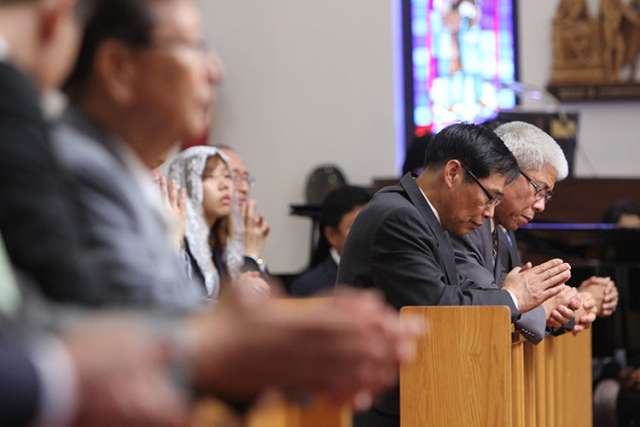20th Sunday in Ordinary Time (Year A) Aug. 17 (Isaiah 56:1, 6-7; Psalm 67; Romans 11:13-15, 29-32; Matthew 15:21-28)
There has always been a battle of wills between God and human beings. Something in our wounded human nature prods us to do our best to possess God for ourselves and the group with whom we identify. This “possession” of God is great for inflating the collective ego and enhancing a sense of superiority towards outsiders. It is also a key contributing factor to religious hatred and violence. Additionally, it prevents us from honest self-examination and robs us of the wisdom and riches of other cultures and belief systems. God is on the other end of the tug-of-war and has very different ideas. God’s intent is always to the greater and the more universal and inclusive.
Linking human energy to God within
By Fr. Ron RolheiserFew thinkers have influenced me as profoundly as Robert L. Moore. Moore is a scholar who has spent almost 50 years studying human energy from the perspective of psychology, anthropology and spirituality. Few scholars are his equal in linking human energy, even when it is raw and grandiose, to the image and likeness of God inside of us. He merits an audience.
Faith is in opposition to fear and doubt
By Fr. Scott Lewis, S.J19th Sunday in Ordinary Time Aug. 10, (1 Kings 19:9, 11-13; Psalm 85; Romans 9:1-5; Matthew 14:22-33)
To many people God seems absent from our world. Often it is difficult to discern the presence of God in one’s own life. Part of the reason is that our perception of God is filtered through far too many expectations. We have set ideas about how God is to be revealed and they are usually dramatic, flashy and filled with displays of power — all fine material for Hollywood biblical epics. Compounding the problem is the tendency of ancient peoples to assign manifestations of nature to the immediate hand of God. Our scientific understanding of the natural order would prevent most of us from seeing the hand of God in an earthquake, hurricane or tsunami.
Marvelous things happen with God
By Fr. Scott Lewis, S.J18th Sunday in Ordinary Time (Year A) Aug. 3 (Isaiah 55:1-3; Psalm 145; Romans 8:35, 37-39; Matthew 14:13-21)
Remember when pillows and blankets on airplanes were free and there was no charge for baggage? Those days are gone forever, and increasingly every dimension of daily life has charges and costs tied to them.
The periphery, where livin’ ain’t easy
By Mary MarroccoA concert I attended last month included George Gershwin’s “Summertime.” Not a favourite of mine, but that evening I felt the song’s appeal. In music and words, it carries a sense of relaxed fullness, an invitation into a lush, protected place where the “livin’ is easy,” the harshness of the world far-off at the edges: “fish are jumpin’ and the cotton is high... there ain’t nothin’ can harm you, with mama and daddy standin’ by.”
No shortcuts to God
By Fr. Scott Lewis, S.J17th Sunday in Ordinary Time (Year A) July 27 (1 Kings 3:5-12; Psalm 119; Romans 8:28-30; Matthew 13:44-52)
If we were granted one wish, what would we ask for? The answer to that question would say a lot about our character and personality.
The Spirit guides
By Fr. Scott Lewis, S.J16th Sunday in Ordinary Time (Year A) July 20 (Wisdom 12:13, 16-19; Psalm 86; Romans 8:26-27; Matthew 13:24-43)
The truly great and powerful are those who often choose not to fully exercise their power. Human cultures tend to follow those who can flex their muscles, bully and threaten and coerce others through fear. Even when displays of power are called for, these individuals are prone to using far more than necessary and often in ways that are unjust and lacking in compassion.
On being perpetually distracted
By Fr. Ron RolheiserThere’s a story in the Hindu tradition that runs something like this: God and a man are walking down a road. The man asks God: “What is the world like?” God answers: “I’d like to tell you, but my throat is parched. I need a cup of cold water. If you can go and get me a cup of cold water, I’ll tell you what the world is like.” The man heads off to the nearest house to ask for a cup of cold water. He knocks on the door and it is opened by a beautiful young woman. He asks for a cup of cold water. She answers: “I will gladly get it for you, but it’s just time for the noon meal, why don’t you come in first and eat.” He does.
God’s word is at work worldwide
By Fr. Scott Lewis, S.J15th Sunday in Ordinary Time (Year A) July 13 (Isaiah 55:10-11; Psalm 65; Romans 8:18-23; Matthew 13:1-23)
When is a word more than a word? We usually associate words with the squiggles on a page or a discrete unit of speech. In the case of the Scriptures this view can lead to narrow, overly literal and superficial understanding.
Live by the Spirit
By Fr. Scott Lewis, S.J14th Sunday in Ordinary Time (Year A) July 6 (Zechariah 9:9-10; Psalm 145; Romans 8:9, 11-13; Matthew 11:25-30)
Wouldn’t it be wonderful if a superhero arrived on the scene and put an end to the wars in Iraq, Syria and Afghanistan, as well as all acts of terrorism and violence?
We often weary in our patience
By Fr. Ron RolheiserBefore the airline hijackings of Sept. 11, 2001, before the shoe-bomber and others like him, it was simpler to travel by air. You didn’t need to take off your shoes to pass through security, you could carry liquids with you, laptops and other electronic devices, if you had any, did not have to be brought out of your carry-on bags. The door to the cockpit wasn’t barricaded with steel, and there was much less paranoia in general about security. You even got to see the pilot occasionally.












